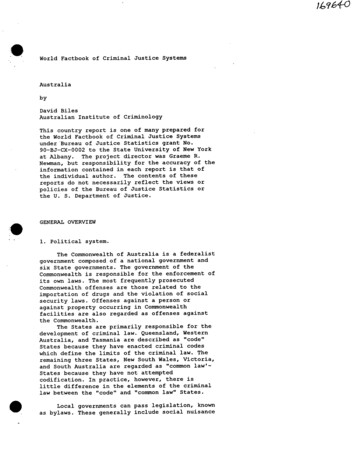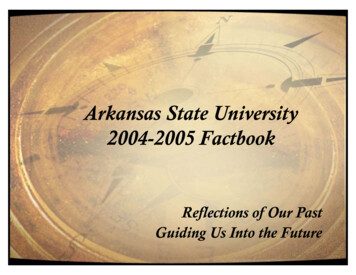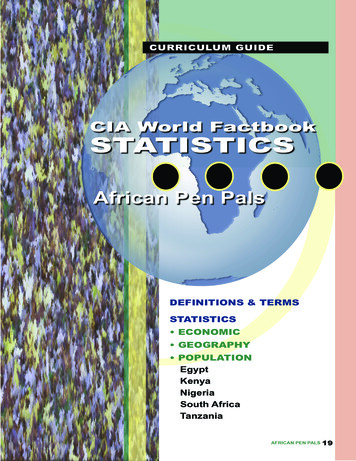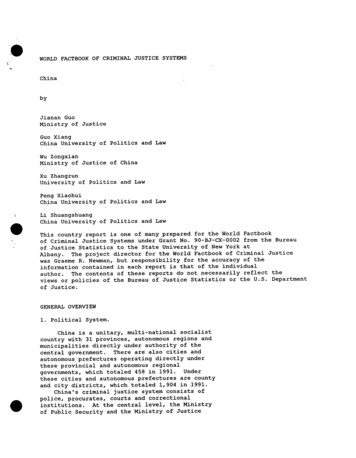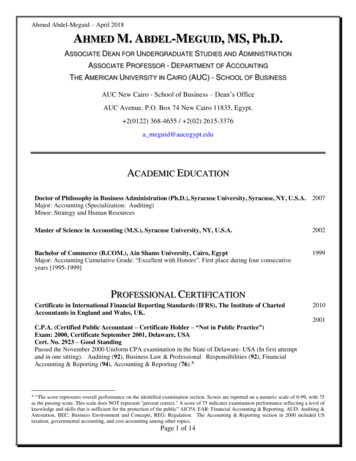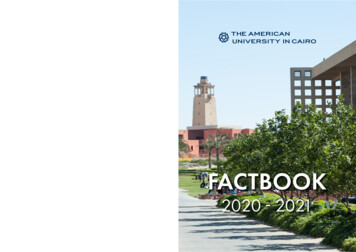
Transcription
FACTBOOKOffice of Strategy Management and Institutional Effectivenesstel 20.2.2615.2231 smie@aucegypt.eduAUC Avenue, P.O. Box 74 New Cairo 11835, Egyptwww.aucegypt.edu2020 - 2021
We are pleased to present the 2020-2021 American University in Cairo Factbook. This annual resource is acompilation of commonly requested data and information about our community and our facilities. Weencourage you to read the introduction to each section prior to reading the individual tables and charts, as theintroduction will provide you with the definitions you need to understand and correctly interpret the data.Various university departments partnered with us in collecting and presenting this information. We wish toextend our sincere thanks to everyone who helped us compile the material included in this edition of AUC’sFactbook, and a special thanks to any office whose name we may have inadvertently missed.Academic SenateCenter for Learning and TeachingCommunity Based LearningDean of Undergraduate StudiesDepartment of AthleticsExecutive Education & External RelationsLibraries and Learning TechnologiesOffice of Marketing Communication and Public AffairsOffice of Budget and Financial PlanningOffice of Campus Planning Design & ConstructionOffice of Facilities and OperationsOffice of Residential LifeOffice of Sponsored ProgramsOffice of Student LifeOffice of Student Financial Affairs and ScholarshipsOffice of SustainabilityOffice of the Chief Technology OfficerOffice of the ControllerOffice of the PresidentOffice of the ProvostOffice of the Vice Provost for ResearchOffice of Enrollment and Student Service CenterSchool of Continuing EducationTechnology Transfer OfficeUndergraduate Research OfficeUniversity RegistrarWe hope you find this Factbook to be a useful source of information. If you have questions, would like to provideus with your feedback, or if there is additional information that you would like to see included, please contactus at smie@aucegypt.edu.Iman Megahed, AVP for Digital Transformation and Chief Knowledge and Strategy OfficerRasha Radwan, Senior Director, Institutional ResearchAlia Mitkees, Senior Director, Strategy ManagementHeba Fathelbab, Senior Director, Assessment & AccreditationHeba Atteya, Senior Director, Business Intelligence & Data AnalysisMohamed Ibrahim, Director, Business Process ImprovementAyah Elkharbotly, Director, Academic Planning & AnalysisNancy El Mahallawy, Research Analyst, Institutional ResearchYousra El Nemr, Strategy ManagerLamiaa Hassan, Research Analyst Assessment and AccreditationAmira Othman, Research Analyst Assessment and AccreditationOmar Yasser, Data ModelerOmar Sedeek, Data ScientistNawal Matarid, Business Intelligence AnalystMohamed El Touhamy, Extract Transform Load DeveloperAmira Motawea, Officer, Academic PlanningMirna Anwar, Senior Officer, Academic PlanningRana Khattab, Officer, Enrollment AnalysisNermin Wafa, Executive Assistant to CKSOMore information on the Office of Strategy Management and Institutional Effectiveness is available nt-and-institutional-effectivenessMore resources are available online act-bookAUC FACTBOOK 2020-20211
TABLE OF CONTENTSMission, History and Organization . 3UNIVERSITY MISSION . 4A BRIEF HISTORY OF AUC . 4BOARD OF TRUSTEES . 11UNIVERSITY SENATE . 13STUDENT GOVERNMENT . 13ACCREDITATION . 14Students . 15ADMISSIONS. 18ENROLLMENT SUMMARIES. 21UNDERGRADUATE ENROLLMENT . 26GRADUATE ENROLLMENT . 31GRADUATION PATTERNS . 36STUDENT ACTIVITIES . 43STUDY ABROAD PROGRAMS . 45CONTINUING AND PROFESSIONAL EDUCATION . 45PROFESSIONAL EDUCATION. 46Faculty . 48FULL-TIME FACULTY . 50INSTRUCTIONAL FACULTY . 51FULL-TIME EQUIVALENT FACULTY . 55Teaching and Academic Support . 56TEACHING. 57LIBRARIES AND LEARNING TECHNOLOGIES . 58CENTER FOR LEARNING AND TEACHING. 59INFORMATION TECHNOLOGY SERVICES . 59COMMUNITY-BASED LEARNING . 60UNDERGRADUATE RESEARCH . 61Research . 62RESEARCH CENTERS . 63SPONSORED RESEARCH. 67TECHNOLOGY TRANSFER . 68Alumni . 69ACTIVE ALUMNI. 71GEOGRAPHICAL DISTRIBUTION. 71ALUMNI CONTRIBUTIONS . 71Finances . 73OPERATING BUDGET . 76UNDERGRADUATE AND GRADUATE TUITION . 77FUNDRAISING . 78Campus Space, Facilities, and Services . 80UTILITY USAGE FOR THE NEW CAIRO CAMPUS . 81CAMPUS SUSTAINABILITY . 81AUC RESIDENCES CAPACITY . 84CAMPUS MAP. 862AUC FACTBOOK 2020-2021
Mission, History and OrganizationAUC FACTBOOK 2020-20213
UNIVERSITY MISSIONThe American University in Cairo (AUC) is a premier English-language institution of higher learning. TheUniversity is committed to teaching and research of the highest caliber, and offers exceptional liberal arts andprofessional education in a cross-cultural environment. AUC builds a culture of leadership, lifelong learning,continuing education and service among its graduates, and is dedicated to making significant contributions toEgypt and the international community in diverse fields. Chartered and accredited in the United States andEgypt, The American University in Cairo is an independent, not-for-profit, equal-opportunity institution. AUCupholds the principles of academic freedom and is dedicated to excellence.A BRIEF HISTORY OF AUCThe American University in Cairo (AUC) is an independent, not-for-profit institution offering English language,American-style liberal arts and professional undergraduate and graduate education to students from Egypt, theregion, and around the world. In Egypt, AUC operates within the framework of a 1975 protocol with thegovernment of Egypt; this protocol is based on a 1962 cultural relations agreement between the Egyptian andthe U.S. governments. In the United States, the University is licensed to grant degrees and is incorporated withinthe State of Delaware.AUC was founded in 1919 as both a preparatory school and a university by a group of Americans devoted toeducation and service in the Middle East. Its founding president, Dr. Charles Watson, wanted to create anEnglish-language university based on high standards of conduct and scholarship and to contribute to theintellectual growth, discipline, and character of the future leaders of Egypt and the region. At first an institutiononly for males, AUC enrolled its first female student in 1928, the same year the first university class graduated.In 1950, AUC added its first graduate programs to its ongoing bachelor of arts, bachelor of sciences, graduatediploma, and continuing education programs, and in 1951, phased out the preparatory school program. By themid-1970s, the University offered a broad range of liberal arts and sciences programs. In the following years,the University added bachelors, masters, and diploma programs in engineering, management, computerscience, journalism and mass communication and sciences programs, as well as establishing a number ofresearch centers in strategic areas, including business, the social sciences, philanthropy and civic engagement,and science and technology. AUC now offers 40 bachelor’s degrees, 50 master’s degrees, and 2 doctoral degreesin applied sciences and engineering in addition to a wide range of graduate diplomas in five schools: Business,Global Affairs and Public Policy, Humanities and Social Sciences, Sciences and Engineering, and the GraduateSchool of Education.Academic program enrollments have grown to 5,743 undergraduates with an additional 1,114 graduate students(Fall 2020). Simultaneously, adult education has also expanded and now serves more than 30,000 students eachyear in non-credit courses and contracted training programs offered through the School of ContinuingEducation. Ninety-five percent of AUC students are Egyptian, with the remaining 5% comprised of 48nationalities from around the world.Long considered a leader in higher education in the region, the University has sought national, regional, andinternational accreditation as a means of fostering excellence in governance and academics. In addition to itsaccreditation by the Middle States Commission on Higher Education, AUC is the first university in Egypt toreceive accreditation from Egypt’s new National Authority for Quality Assurance and Accreditation in Education(NAQAAE) at the institutional level, and the School of Sciences and Engineering at the school level. In addition,many of AUC’s academic programs have received specialized accreditation.For most of its nearly 100-year history, AUC was located on a nine-acre campus in the heart of downtown Cairo,a city of more than 18 million people and the largest urban area in the Middle East and North Africa. In 1997,the University decided to relocate the campus to the planned community of New Cairo and use the opportunityof building an entirely new campus to create a “City of Learning”, designed to embody the University’s liberalarts tradition and provide room for growth. The University launched a very successful 100 millioncomprehensive capital campaign in 2003 to raise construction funds as well as additional monies for4AUC FACTBOOK 2020-2021
scholarships, professorships, and other strategic areas. In 2008, the University moved its academic programsfrom its downtown campus to a purpose-built 260-acre campus in the Cairo suburbs. The downtown campuswas refurbished to secure the growing continuing and professional education programs as well as promotecultural and public service programs more widely.Since its move to the new campus, the University has explored ways to make best use of the beautiful, state ofthe art facilities for academic and co-curricular programs, students, faculty, the staff, and the community.Political, economic, and social upheaval in Egypt and the region following the uprising of 2011 greatly affectedthe entire AUC community but also reinforced the importance of AUC’s mission and the role it plays in the region.PresidentsFrancis J. Ricciardone, PresentLisa Anderson, 2011-2015David D. Arnold, 2003-2010John D. Gerhart, 1998-2002Donald McDonald, 1990-1997Richard F. Pedersen, 1978-1990Cecil K. Byrd, 1973-1977Christopher Thoron, 1969-1973Thomas A. Bartlett, 1963-1969Raymond F. McLain, 1955-1963John S. Badeau, 1945-1953Charles Watson, 1919-1945Timeline of Highlights in AUC’s History1912Charles Watson completed a report outlining the vision for AUC.1919AUC was officially incorporated in Washington, D.C.19201921First 142 students began classes’ equivalent to the final two years of high school. Student Unionwas formed.School of Oriental Studies was established.1923First commencement was held.19241926Degrees were recognized by the New York State Board of Regents as equivalent to junior collegedegrees; Division of Extension (forerunner to the School of Continuing Education) was established;first campus newspaper, AUC Review, was issued.First university-level courses were offered; Ruth Litt donated 100,000 for an auditorium to benamed after her grandfather, William Dana Ewart.Old Boys Club was created for alumni.1927AUC offers four years of secondary school and four of college.1928First university-level bachelor's degrees were awarded to three students; AUC welcomed firstfemale student Eva Habib el Masri.Hill family started AUC's first endowment fund with 450,000.1925192919311937Old Boys Club developed into Alumni Association; Gillespie family donated 65,000 to buildOriental Hall.Om Kalthum performed in Ewart Hall.1940King Abdullah of Jordan visited AUC.1941AUC hosted concerts in Ewart Hall for allied soldiers in Egypt.19421950AUC students petitioned Ministry of War to allow an instructor to teach them military formations,which soon replaced acrobatics and team sports.First graduate degree was awarded.1951Last preparatory class graduated, making AUC strictly a university-level institution.1952Helen Keller visited AUC.AUC FACTBOOK 2020-20215
19531959Hill House was formally dedicated as first student dormitory on campus; Social Research Centerwas established.Egyptian presidents Mohammed Naguib and Gamal Abdul Nasser attended AUC’s Arabic LanguageDay Convocation.English Language Institute was opened; School of Oriental Studies became the Center for ArabicStudies; AUC obtained Creswell Collection.Hill House was rededicated as a library.1960AUC Press was established.1961AUC’s name was changed from “at” Cairo to “in” Cairo.19641966Buildings were purchased from the Greek community; Falaki building built for use as a studentdormitory.Science Building construction was completed.1967Center for Arabic Study Abroad was opened; the government of Egypt sequestered AUC.1972AUC Press obtained exclusive English language rights to the works of Naguib Mahfouz.19741978Ministry of Higher Education recognized AUC degrees as equivalent to those offered by Egyptianuniversities. Sports program won representation in the National Universities Sports Union.The government of Egypt relinquished control of AUC; a protocol between AUC’s Board ofTrustees and the government of Egypt governed its operations.AUC Press published the first Naguib Mahfouz novel in English.1979Desert Development Center was established.1982New library on the Greek Campus was completed; the Middle States Commission on HigherEducation granted AUC full accreditation.Opening of Egypt’s first university bookstore195419561975198519881990Mahfouz won Nobel Prize. AUC Press was his English-language publisher (with nine of his novels inprint) and worldwide agent.Abdul Latif Jameel Building for Middle East Management Studies was inaugurated; core curriculumwas introduced; Model United Nations was started.Model Arab League was started.1991AUC opened Zamalek building.1992Rare books library was inaugurated.1993University Senate was established.19941996AUC celebrated its 75th anniversary; AUC hosted the Fifth International Conference on Populationand Development held under the auspices of the United Nations.Grand Mufti Sheikh Muhammed Tantawi and Pope Shenouda III spoke at AUC; AUC Professor KentWeeks rediscovered KV5 in Valley of the Kings.Naguib Mahfouz Medal for Literature was established.1997AUC purchased land in New Cairo.1998U.S. First Lady Hillary Clinton spoke in Ewart Hall. AUC receives reaffirmation of accreditation Fromthe Middle States Commission on Higher Education.Queen Rania Al Abdullah ’91 visited AUC. Distinguished guests in first years of the centuryIncluded Jimmy Carter, Kofi Annan, Condoleezza Rice, and Nobel laureates Ahmed Zewail andMohamed ElBaradei.New Cairo Campus design was completed, and the cornerstone laid by Egypt’s First Lady SuzanneMubarak’77, ’82.AUC established Leadership for Education and Development scholarship program. AUC signedconstruction contract for New Cairo Campus.AUC Press published its 1,000th book.19891995200020032004200720086First day of class was held on the purpose-built, 260-acre New Cairo Campus. AUC receivedreaffirmation of accreditation from the Middle States Commission on Higher Education.AUC FACTBOOK 2020-2021
��s First Lady Suzanne Mubarak ’77, ’82 inaugurated New Cairo Campus. AUC celebrated its90th anniversary.The University introduced its first PhD program, in the School of Sciences and Engineering. AUCbecame the first university in Egypt to be accredited by Egypt’s National Authority for QualityAssurance and Accreditation of Education (NAQAAE).January 25th Revolution. Demonstrations occurred near AUC’s Tahrir campus but the universitycompleted all academic programs. Nobel laureate Joseph Stiglitz lectured at AUC.AUC became the first institution of higher education in the Middle East and North Africa toconduct a comprehensive study measuring its carbon footprint. Distinguished guests includedNobel laureate and former US president Jimmy Carter and former prime minister of Norway GroHarlem Brundtland.AUC leased Greek Campus to create first technology park in downtown Cairo and licensed fourpatent-pending technologies to create Egypt’s first university spin-off company.AUC awarded first PhD, in engineering, to Yosra El Maghraby. The School of Business establishedEgypt’s first university-based business incubator, AUC Venture Labs, to commercializetechnologies and innovations developed by Egypt-based startups.AUC wins accolades for its campus sustainability programs; its public policy and administrationprograms are among the first outside the US to be accredited by NASPAA; at 345, its QS globalrankings put it among the top universities world-wide.First AUC Research Day held; Eduniversal ranks AUC graduate programs among best 200worldwide,AUC takes initiative to transfer nearly 5,000 antiquities to the Egyptian government. AUC awardsemergency scholarships to more than 2,200 students due to the floatation of the Egyptian pound.Three AUC community members appointed as Egyptian ministersAUC is the first University in the region to offer a blended degree, pairing with the MassachusettsInstitute of Technology to grant MITx MicroMasters online learners’ credits that would counttoward the completion of a full master’s degree at AUC. The University is the first in the world tocollaborate with MIT in recognizing credits for this online program.AUC is the first University in Egypt and among the first worldwide to offer a FinTech programthrough a new concentration in the field under its Master of Science in finance, with support fromLuqman Weise Capital.The Middle States Commission on Higher Education (MSCHE) has reaffirmed its accreditation ofAUC through the 2026-2027 academic year. The only University in Egypt that holds thisaccreditation, AUC received the top level of MSCHE's reaffirmation of accreditation, without anyrequirements and noting a number of significant accomplishments. Out of 523 institutionsworldwide that are accredited by MSCHE, only 17 — including AUC — are outside of the UnitedStates, including four in the Middle East.AUC kicked off its yearlong centennial celebrations in February 2019, including the phase-oneinauguration of the Tahrir Cultural Center.AUC launched its 100 million Centennial Campaign, which has raised 86% of its goal. At theeighth annual Benefit Dinner in New York at The Metropolitan Museum of Art, AUC raised morethan 1.15 million for Centennial Scholarships.AUC, Cornell University and the Massachusetts Institute of Technology are the Americanuniversities selected to launch three USAID-funded Centers of Excellence in Egypt, partnering withpublic universities. The project, worth a total of 90 million, is conducted in collaboration withEgypt’s Ministry of Higher Education and Scientific Research.2020AUC launched its Summer@AUC program, the first-of-its-kind in Egypt, offering undergraduatefreshman-level courses for high school students (College Bound: AUC) and Summer@AUCBootcamps.The United States Agency for International Development awarded AUC the 36million USAID Scholars Activity, a 10-year cooperative agreement that will fully cover the tuition of700 students from Egypt's 27 governorates to study at AUC or one of its partner universities in thecountry.AUC FACTBOOK 2020-20217
AUC updated its 1975 protocol with the Egyptian government and signed a Memorandum ofUnderstanding with Egypt’s Ministry of Higher Education and Scientific Research for the Universityto annually allocate 30 full-tuition scholarships to the government for Egyptian public schoolstudents who wish to pursue their undergraduate studies at AUC.Responding to the COVID-19 global pandemic, AUC pioneered the shift to online instruction for itsspring and summer classes in 2020.AUC held commemorative events in celebration of its centennial, beginning in February 2019 at AUCTahrir Square and culminating in February 2020 at AUC New Cairo. The yearlong centennialfestivities took place not only in Cairo but in major cities worldwide, from Centennial AlumniSpeaker Series in Dubai, Boston, London and Amman to international conferences, exhibitions,lectures and performances.SCHOOLS AND ACADEMIC PROGRAMSThrough its six schools and the Academy of Liberal Arts, the university offers 40 undergraduate majors, 50master’s degrees, and 2 doctoral degrees. The schools serve 6,931 students and provide educationalopportunities to enhance professional and job skills of more than 30,000 non-degree students.Academy of Liberal ArtsThe Academy of Liberal Arts (ALA) is the cornerstone of liberal education at AUC. Established July 1, 2013, theALA is comprised of three departments: The Department of Arabic Language Instruction (ALI), the Departmentof English Language Instruction (ELI) and the Department of Rhetoric and Composition (RHET). The academy'smore than 100 dedicated faculty members provide foundational language, writing, critical thinking and crossdisciplinary courses for AUC undergraduate students, including cornerstone classes in the new FreshmanProgram of the Core Curriculum, as well as providing intensive Arabic and English-language instruction for awider community, including graduate and international students.Graduate School of EducationThe Graduate School of Education (GSE) contributes to education reform in Egypt and the region by providingthe theoretical and applied components needed to build the capacity of professionals and policymakers in theeducation system.Graduate ProgramsEducational Leadership (MA)International and Comparative Education (MA)Teaching and Learning (MEd)School of BusinessThe School of Business has a focus on professional programs and is widely recognized for its high-qualityprograms. The school prides itself on building these programs on a solid liberal arts foundation, which providesgraduates with the background needed to understand the real world and allows them to bring this perspectiveinto their professional lives.Undergraduate ProgramsAccounting (BAC)Business and Entrepreneurship (BBE)Business in Finance (BBF)Business in Marketing (BBM)Economics (BA)Management of Information and Communication Technology (BBA)Graduate DegreesBusiness Administration (MBA)Economics (MA)Economics in International Development (MA)Finance (MS)International Management (MIM)8AUC FACTBOOK 2020-2021
School of Continuing EducationThe School of Continuing Education (SCE) provides certificate programs, noncredit semester-long, courses andcustomized courses of variable length to fulfill the continuing educational needs of individuals and organizationsin Egypt and the Middle East. SCE’s regularly scheduled courses and certificate programs are offered in bothTahrir Square and New Cairo. Customized courses may be conducted on site at the organization’s facilities. Tenlaboratories allow for state-of-the-art computer and English-language training at AUC’s Tahrir Campus. Specialsummer youth programs provide academic enrichment and skill development for children.School of Humanities and Social SciencesThe School of Humanities and Social Sciences (HUSS) focuses on enhancing its students' ability to analyzeopinions and assumptions, become more aware of the past and more open to new ways of thinking, and developa capacity for critical thinking and creative approaches to problem-solving.Undergraduate ProgramsAnthropology (BA)Arabic Studies (BA)Egyptology (BA)English and Comparative Literature (BA)Film (BA)Graphic Design (BA)History (BA)Honors Program in History (BA)Honors Program in Political Science (BA)Music Technology (BA)Performance (BMA)Philosophy (BA)Political Science (BA)Psychology (BA)Sociology (BA)Theatre (BA)Visual Arts (BA)Graduate DegreesArabic Studies (MA)Community Psychology (MA)Comparative and Middle East Politics and Society (MA)Counseling Psychology (MA)Egyptology and Coptology (MA)English and Comparative Literature (MA)Philosophy (MA)Political Science (MA)Sociology - Anthropology (MA)Teaching Arabic as a Foreign Language (MA)Teaching English to Speakers of Other Languages (MA)School of Global Affairs and Public PolicyThe School of Global Affairs and Public Policy (GAPP) prepares its graduates to take the lead in shaping the futureof their nations and the world at large, with a strong belief in the interaction of international and public affairs,an unwavering commitment to ethics and the rule of law, and a recognition of the unique role the media playsin shaping public policy.Undergraduate ProgramsCommunication and Media Arts (BA)Integrated Marketing Communication (BA)Middle East Studies (BA)Multimedia Journalism (BA)Graduate DegreesGender and Women’s Studies in the Middle East/North Africa (MA)Global Affairs (MGA)AUC FACTBOOK 2020-20219
International and Comparative Law (LLM)International Human Rights Law (MA)Journalism and Mass Communication (MA)Middle East Studies (MA)Migration and Refugee Studies (MA
1928 First university-level bachelor's degrees were awarded to three students; AUC welcomed first female student Eva Habib el Masri. 1929 Hill family started AUC's first endowment fund with 450,000. 1931 Old Boys Club developed into Alumni Association; Gillespie family donated 65,000 to build Oriental Hall. 1937 Om Kalthum performed in Ewart Hall


